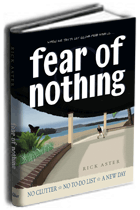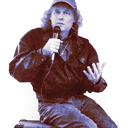Effective clutter-busting may depend on taking some time to put yourself in the right frame of mind first. Since today is the first day of March of Trash 2016, it seemed the perfect time to look at this subject. Most of all, be patient getting started with clutter, since getting started is often the biggest hurdle for a person to get over.
I have to start with the biggest complaint that keeps people from starting on clutter. This emotional obstacle ironically affects the people who are most acutely aware that they have a problem. It is the feeling of overwhelm. This feeling is based on the idea that the clutter is bigger than you are. In a strictly material sense, that is almost certainly true. You are a rare person indeed, at least in the industrialized world, if you do not own at least your own weight in unused possessions. In a practical spiritual sense, though, your accumulated possessions cannot be bigger than you are. You can bend them, shape them, mold them . . . change them to suit your intentions. If this seems a daunting task, it is because it will take some time to do this perfectly.
But to do it imperfectly while still making a difference? That hardly takes anything. I have two cardboard boxes where I should have one. I tear up the less impressive of the two boxes and throw the scraps of cardboard on the compost heap. So what? I have hardly done anything. It is a small effort, certainly nothing to brag about, yet the outcome is measurable: I have given myself another cubic foot of space to use in my house. It is small, a small effort, a small change, but that is the nature of progress. The solution to approaching a problem that looks overwhelming is to do something underwhelming, like ripping up one cardboard box.
In his book Excuses Begone Wayne Dyer took on one aspect of the feeling of overwhelm by upending the excuse, “It’s too big.”
Perhaps surprisingly, this belief only needs to be reversed. If you believe that people that people are successful because they think big, for instance, I’m here to tell you that success demands small thinking!
Dyer goes on to explain how any great accomplishment is the result of a series of small actions, one after another.
This is easy to see when it comes to clutter. Here, a grand plan won’t help you nearly so much as the willingness to take one step every day. Do something underwhelming today, and again tomorrow, and by the end of a month you will see a transformation.
As you start a clutter-busting session, you may need to remind yourself of the priorities of the situation. Stuff by itself means nothing. Action is what changes the world. Clutter, in most cases, is not a problem that needs to be solved quickly. Unless circumstances force you to go faster (that is, you’re getting ready to move), you should be looking to reduce your possessions by one percent per day at most. Ideally, you want to gently let go of the past so that you can experience what the future has to offer. It may help to work quietly. It may be easiest to start with the stuff you most obviously shouldn’t have — and there is always something that fits that description.
You may have to gather your energy before you go take on the clutter. Think of how you’ll have more space to work with and be living in a cleaner environment. Keep things in proportion — gather enough energy for the work you plan to do, and stop well before your energy is depleted so that you’re able to return to your work tomorrow. It is the decisions, not the dust, that is likely to wear you out first in clutter-busting, so give yourself license to postpone difficult decisions on items that obviously are not your most egregious possessions. Move on and look for easier decisions.
No one said clutter-busting would be easy. Give yourself the benefit of a few minutes to take on a clutter-busting state of mind, and you’ll make the whole process easier on yourself.



No comments:
Post a Comment